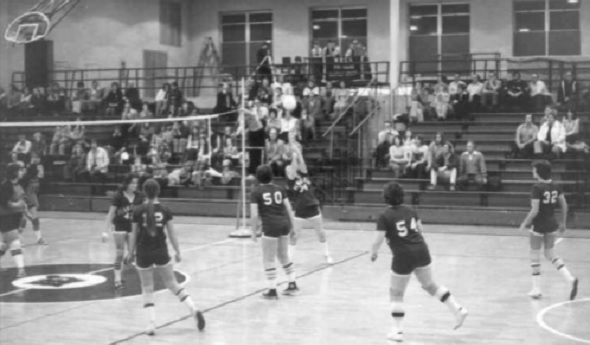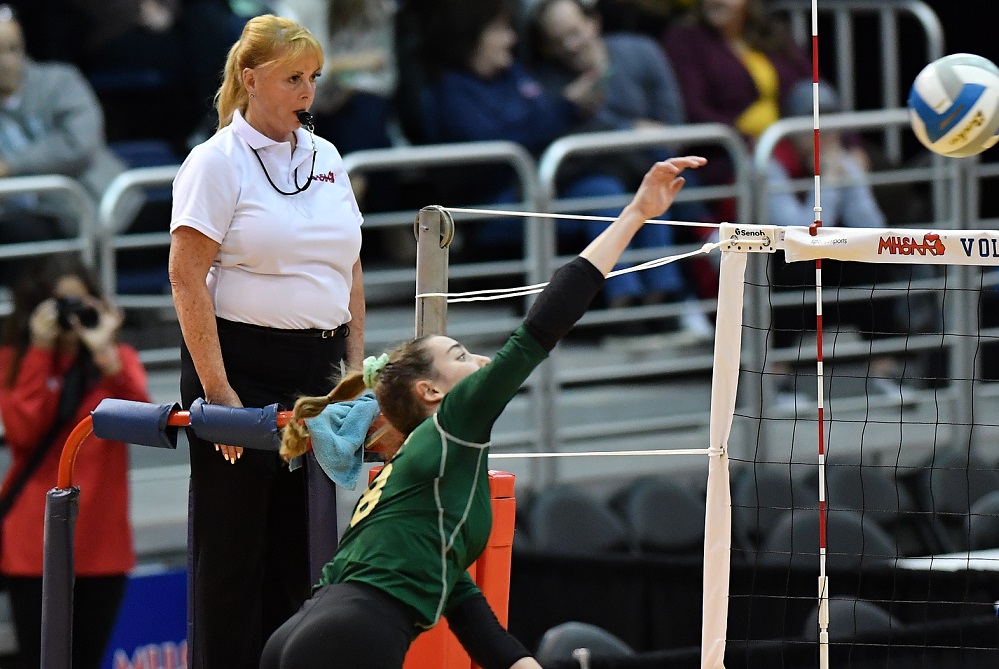
#TBT: MHSAA Hosts 1st Volleyball Finals
September 7, 2017
By Geoff Kimmerly
Second Half editor
Girls volleyball has seen its share of changes over more than four decades as an MHSAA sport – its season moving from winter to fall and the addition to rally scoring in 2005-06 surely would be counted as the most significant.
Along the way, it has become the most popular high school girls sport in the state in terms of participation, with more than 19,000 athletes taking part last season.
The legacy will continue later this season when the MHSAA crowns its 42nd class of champions in the sport. Here’s a look back at the first championship day in 1976, written by MHSAA historian Ron Pesch for a “Finals Flashbacks” published in the 2006 MHSAA Finals program:
The sport of volleyball was invented in 1895 at Springfield College in Holyoke, Massachusetts. Added to the Olympics in 1964, the international amateur athletic event exposed the power game to a broad audience.
In the winter of 1976, the MHSAA added volleyball to the array of championships sponsored by the organization. A total of 458 teams participated in the first volleyball tournament. Broken into three classifications, Class A contests were played on the campus of Schoolcraft College in Livonia, while Class B games were held at Read Field House at Western Michigan University in Kalamazoo. Bay City’s Delta College played host to the Class C-D tournament.
Eight teams qualified for the finals in each classification. Quarterfinal, Semifinal and Final matches were played on the same day, made possible because games were timed during that first year.
Dearborn Fordson had won a non-MHSAA tournament in 1975, and led by tri-captains Lynn March, June Scott and Joan Ferguson, the Tractors earned the MHSAA’s first Class A title by disposing of Grosse Pointe North in the Semifinals, 15-6, 15-4. Fordson then knocked off previously unbeaten Ferndale in the Final, 15-13, 15-5 for the crown.
Parchment carried a nine-player roster, including five seniors, into the first Class B tournament. The Panthers thumped Sturgis, 15-0, 15-8 in the Semifinals, then downed Tecumseh, 15-8, 15-11, to finish the year with a 30-3 record.
Undefeated Flint Holy Rosary, led by coach Jo Lake, rolled to the 1976 Class C-D crown with a 14-5, 13-8 win over Kalamazoo Christian in the Final. The team snagged the Class D title the following year as well, establishing a winning streak of 92 straight matches.
PHOTO: Michigan high school volleyball teams compete during the early days of the sport in this state. (MHSAA file photo.)

Be the Referee: Volleyball Obstruction
By
Brent Rice
MHSAA Assistant Director
September 23, 2021
Be The Referee is a series of short messages designed to help educate people on the rules of different sports, to help them better understand the art of officiating, and to recruit officials.
Below is this week's segment – Volleyball Obstruction - Listen
Ever wonder why in volleyball some balls hit into obstructions remain in play, while others are replayed, and some end the rally?
If a ball hits an obstruction over a playable area during a rally, and then is played by the same team, it has the same status as any other hit. However, that isn’t the case in all other instances.
If the ball hitting the wall or an object attached flush to the wall doesn’t actually interfere with a player’s legitimate effort to play the ball, the ball is dead and a loss of rally and point shall be awarded. If it does interfere with the playing of the ball, a replay is declared if the wall is less than six feet from the boundary.
If the ball hits a suspended backboard over the playable area, a replay will be declared as long as the referee believes the ball would have remained in play. Serves that hit any obstruction are a loss of rally and point.
Previous editions
Sept. 16: Catch or No Catch - Listen
Sept. 9: Intentional Grounding – Listen
Sept. 2: Pass Interference – Listen
Aug. 26: Protocols and Mechanics – Listen

